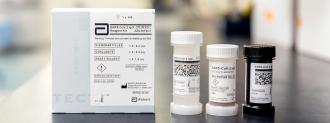A million coronavirus antibody tests are heading to hospitals and labs across the United States this week — and tens of millions more could be right on their heels.
On April 15, Abbott Laboratories announced that it was launching a test that detects coronavirus antibodies in blood samples.
According to the company, the test is incredibly accurate — in a study, it identified the antibodies in 73 out of 73 positive samples tested and ruled out their presence in 99.6% of the 1,070 negative samples tested.
Coronavirus antibody tests could help bring social-distancing measures to an end.
The test runs on Abbott’s ARCHITECT i1000SR and i2000SR laboratory instruments, which can process between 100 and 200 of the new coronavirus antibody tests every hour and are already in use at more than 2,000 locations across the U.S.
By the end of this week, Abbott expects to deliver one million of the tests to hospitals and labs. It aims to ship four million of the tests in April, and by June, the company says it will be equipped to manufacture 20 million of its coronavirus antibody tests every month.
“It’s clear that the demand for testing is big,” Abbott CEO Robert Ford said, according to CNBC. “It’s not going to go away.”
Abbott seems determined to play a major role in meeting that demand — it’s already released two other coronavirus tests, both of which detect current coronavirus infections.
Its coronavirus antibody tests, however, offer some unique advantages over those diagnostic tests.
Antibodies are proteins the immune system creates when it encounters a new pathogen (virus or bacteria). They’re designed to identify and attack that specific pathogen if it ever infects the body again.
If a person has coronavirus antibodies in their blood, then, it tells us two things: they’ve already caught the coronavirus, and they now have some level of immunity to it.
That first piece of information could help researchers track the coronavirus more accurately — some people don’t develop coronavirus symptoms, meaning they never get tested for the virus and are, therefore, never diagnosed with COVID-19.
The second piece of information learned from coronavirus antibody tests could help bring social-distancing measures to an end.
Individuals who know they already have some immunity to the coronavirus won’t have to worry as much about catching it while out and about.
And once approximately 70% of the population has this immunity, the virus will have a hard time finding new people to infect — meaning we might all be able to start resuming normal life.






